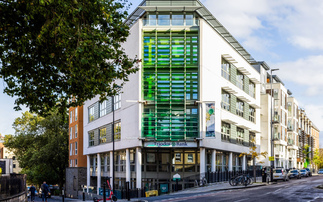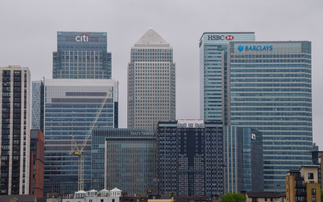All parties involved in the controversial privatisation process are keeping tight-lipped, but at some point the government is going to have to address questions about the future of the green bank
The bids are in. Or at least, we think the bids are in. The privatisation of the Green Investment Bank (GIB) may involve the sale of an institution developed with £3.8bn of taxpayer money and tasked with playing a key role in the delivery of a host of economically and environmentally strategic goals for the UK, but Sam Allardyce has more chance of winning an employee of the year award than the public has of finding out how the controversial sale is going.
Sky News reported last month that two bids are in the running for the bank - one from a consortium led by Sustainable Development Capital Ltd (SDCL) and involving Swiss-based Partners Group, General Electric, the Pension Protection Fund, Lloyds Banking Group and Royal Bank of Scotland as executives seek to convince ministers of the bid's British credentials, and the other from Australian banking giant Macquarie Group.
BusinessGreen understands the Sky News report is broadly accurate. However, the GIB, SDCL and Partners Group all declined to provide the broadcaster with a comment in response to its story. Meanwhile, senior executives at Macquarie Group similarly declined to provide BusinessGreen with any update on their reported interest in the GIB in a recent interview. Completing the set the Department for Business, Energy, and Industrial Strategy (BEIS) has refused to confirm or deny the latest report.
This omerta is anything but surprising. Negotiating a multi-billion pound deal is sensitive enough at the best of times, let alone when it involves taxpayers' money. Commercial confidentiality is routinely cited as a reason to keep information relating to a bidding process under wraps and you would not expect ministers to provide a running commentary (to use the current en vogue phrase) as they seek to maximise returns for the public purse, while ensuring the GIB continues to honour its original green investment remit. It will be highly surprising with the GIB makes more than a passing appearance in Business and Energy Secretary Greg Clark's speech to the Conservative Party conference this morning.
For the record, in response to a series of questions about the government's current position on GIB privatisation a BEIS spokesman could offer only a single sentence: "The sale process is ongoing and is commercially confidential so we are not commenting on speculation". The GIB itself similarly declined to comment.
However, that does not mean these questions are about to go away, far from it. In fact, they are likely to be echoed and expanded upon by more and more interested parties as the privatisation process winds its way forward. Here are just 10 of the questions we put to BEIS:
- What assurances will the government seek about any post acquisition rationalisation process? Do you expect to see job losses?
- Will the government consider the wider green credentials of the bidders? For example, would it be concerned if the GIB ends up owned by a bank or investors with significant fossil fuel interests? Is there a concern this could create a conflict of interest?
- Does the government and GIB regard two bids as sufficient for a competitive bidding process?
- Is the intention still to sell 100 per cent of the government's stake in the bank? Has any consideration been given to how the GIB could support the UK's promised industrial strategy? Has any consideration been given to the argument that the industrial strategy justifies the government retaining some form of stake in the bank?
- What is the role of the GIB board in considering the two bids?
- Will the sale process be subject to any form of parliamentary scrutiny before it goes ahead? What is the government's response to critics who argue that given previous criticism of privatisation processes and the fact the sale was not in the Conservative Party manifesto parliamentary scrutiny is justified?
- What steps will the government and GIB take to ensure it gets maximum value for the taxpayer from the process?
- What assurances will the government and GIB seek from the bidders on the level of investment the bank will continue to mobilise in the green economy and the support it will provide for the government's wider climate goals?
- Beyond the planned special share, what steps will the government take to ensure the GIB continues to invest in projects that are perceived to be higher risk?
- Given one of the bids is reportedly being positioned as a British bid and the other is from an Australian bank will the government apply any form of national interest/security test to the bids, as has been mooted for the sale of other strategically important British businesses?
All of these questions are legitimate and raise important points about how the privatisation process will be managed, whether the government has learnt the lessons from previous much-criticised privatisations, and whether post-privatisation the GIB will be able to continue to play an important role in delivering on the UK's long term decarbonisation and energy security goals.
And there are further questions: will the GIB get assurance that its headquarters will remain in Edinburgh, a potentially important consideration given the current post-referenda state of relations between the Scottish and Westminster governments? Following a sale what would happen to the £200m project between DECC and the GIB to mobilise investment East Africa, South Africa, and India? Does the UK government really want a taxpayer-backed institution being sold in a way that ensures future profits from it flow to Sydney or Zurich? What happens if the bids are deemed too low or one of the bidders pulls out? After all, when it comes to energy-related deals (CCS, nuclear, etc) the government does not have a great record of getting value for money when it is forced to negotiate with a single party.
Most important of all, and as I've argued before, given the government appears to be a) softening its stance slightly on deficit reduction, b) committed to delivering an industrial strategy, and c) working on a decarbonisation plan that will require the mobilisation of billions of dollars of cost-effective finance, is there not a case for ministers retaining a stake of some sort, even if more private capital is needed to keep the bank investing.
As former Conservative MP Laura Sandys argued on the ConservativeHome website last week, questions about the privatisation process are entirely justified. "The low carbon community... [is] asking how the government can ensure that in the private sector the GIB remains a champion for the green, the clean and the modern?" she observed. "The answer is that whoever takes the reins of the Bank it is crucial that they are committed to maximise the wider industrial value of the bank for the benefit of UK plc."
She added that the new owners must pass two broad tests: "First, they will not only rely on investing in well-established low carbon technologies but novel innovative solutions - we need it to stay brave. Second, they continue the Bank's commitment to the British green technology and industrial sector... The Green Investment Bank under new ownership has to show it will put the British green investment growth first."
If it weren't hamstrung by commercial sensitivity issues, the government would no doubt argue it has addressed many (but not all) of these concerns through its plans to ensure the creation of a special share in the bank to be held by special directors tasked with ensuring the bank's green remit is retained. But while the special share eases fears the bank would be turned into a mechanism for mobilising investment in 'low carbon' fracking projects or unverified biomass assets, it cannot alone ensure the bank is provided with requisite levels of capital post-sale to play a meaningful role in the UK's low carbon transition. It will struggle to address any conflicts of interest that may arrive with a new owner that also retains sizeable fossil fuel assets. And it may find it difficult to convince management to invest in higher risk, early stage renewables technologies.
If the government does choose to continue down the full privatisation path it needs stronger assurances than those offered by the proposed special share alone, which would only have a role to play in the highly unlikely event the bank's new owners seek to ditch GIB's green remit altogether. The reality is unless the new directors are much more assertive than anyone expects the special share will end up having little more than symbolic value. There may be some reputational risk for the new owners if they challenge the special share directors' recommendations, but technically there is not much the directors can do unless the new bank starts trying to invest in coal mines.
The government may understandably wish to draw a veil over a highly sensitive bidding process, but at some point important questions about how Ministers delivered the privatisation of one of the UK's most important green institutions will need answering. The privatisation of the Royal Mail may have been controversial, this process carries all the same risks about maximising value for money, as well as legitimate fears getting it wrong could badly undermine the UK's efforts to build a sustainable green economy. The bids may be in, but it will soon be time to reveal whether they are any good or not.









